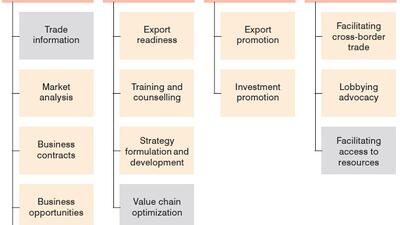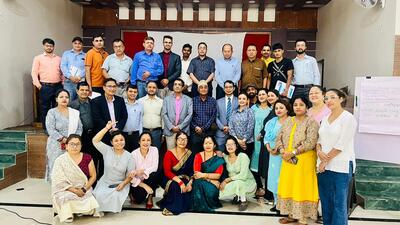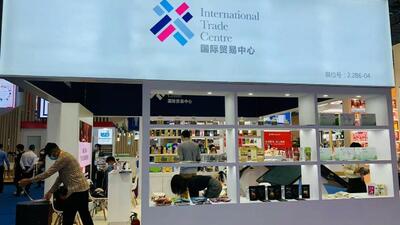
Successful export promotion: lessons from emerging economies
Emerging economies such as Brazil, China and India have been very successful in enhancing trade performance. But how have they actually achieved this – and what lessons could less developed countries learn from their experiences?
One element that works against improved trade performance is the high cost of trading faced by many emerging economies and developing countries. This is often the result of poor infrastructure as well as cumbersome procedures at national borders.
Support for trade-related infrastructure and trade facilitation seeks to address such constraints and has been effective in improving trade performance and competitiveness. Cooperation with the private sector – and state-business relations more generally can also contribute positively to trade performance.
Three key ingredients can ensure a country’s successful trade performance: support for trade-related infrastructure such as roads, railways, ports, energy and telecommunication; trade facilitation and the improvement of rules and procedures that govern how goods cross borders; and effective state-business relations.
Going forward on trade-related infrastructure
Experiences in China, India and Brazil present lessons on how overlapping challenges that impede the private-sector financing of infrastructure have been tackled. In a nutshell, it is important to establish a favourable institutional environment for infrastructure development, look for domestic institutional investors, seek foreign investment with the support of the public sector. This could be done by providing credit guarantees, supporting public-private partnerships (PPPs), and enabling private participation in infrastructure, for instance by enhancing upstream preparation involving sector, policy and legal and regulatory reforms.
In China and Brazil, bank loans have helped to secure long-term financing, which is essential for infrastructure investments. The main substitute for bank finance for infrastructure if, for example, governments are not prepared to agree to enough contingent fiscal liability (as has happened in India), is to search for domestic institutional investors. The creation of new pension schemes offers some potential by producing a market for local currency-denominated long-term securities, thereby reducing the demand for bank finance.
Less developed countries could search for foreign investors – a move that could be supported by the provision of credit guarantees from the public sector, either directly through loan guarantees or indirectly through regulatory forbearance at public sector banks. Brazil, for example, has motivated foreign companies to invest in public-private partnerships. Brazilian energy companies have issued shares and bonds in international markets, having had investment-grade ratings and having profited indirectly from sovereign guarantees. This could be a promising option for some larger corporations or public utilities in less developed countries.
Going forward on trade facilitation
Following the example of China, India and Brazil, it is essential for less developed countries to boost the use of information and communication technology, promote electronic data interchange and single window facilities for submission and processing of information and documents. They must also support the harmonization of documentary requirements across countries, minimize physical inspections, in particular through adoption of risk management techniques, and introduce industry and sector-specific trade facilitation initiatives, such as for agricultural products or low-valued exports. While these trade facilitation approaches offer the potential to enhance a country’s trade performance, improvements in trade performance also call for tackling the supply-side constraints to a country’s potential to make use of improved trading conditions.
The experience of those three nations suggests that one major focus should be on the implementation of straightforward trade facilitation measures and on prioritizing paperless trade through the use of information and communication technology. In China, for example, paperless clearance procedures have increased the speed of customs clearance dramatically. Compared to traditional customs procedures, using paperless customs clearance reduces the average time spent on imported and exported products by 9.3 and 0.7 hours respectively.
Less developed countries should also consider the introduction of risk management techniques to reduce the need for inspections. In addition, trade facilitation policies for low-valued exports have real potential for many less developed countries, which can draw inspiration from their introduction in countries like Brazil. There, the government simplified export procedures for exports of value less than $10,000 while addressing the problem of limited access to affordable transport for small and medium-sized enterprises by making greater use of the postal network, supporting them in exporting their products quickly. Some 8,000 exporters are using Exporta Fácil, representing almost 40% of total Brazilian exporters, many of which would not have otherwise shipped their products abroad. Since 2000, more than US$1.8 billion worth of goods has been processed by the scheme.
Going forward on state-business relations
Formalized state-business relations can facilitate economic performance, for example, on the basis of better allocation efficiency regarding government spending and better growth and industrial policies. However, they should be disciplined by competition policies to prevent them from becoming collusive rather than collaborative. The case of India suggests that a destructive collusive relationship can be changed into a more collaborative one when leaders and elites establish developmental coalitions.
Effective state-business relations require safeguarding buy-ins from all actors, addressing vested interests that resist reform and creating a sound framework for competition. Capacity building and safeguarding buy-ins regarding state-business relations necessitate a strong state that is highly committed.
Tackling vested interests requires coordination among other interest groups that can benefit from reform. Competition authorities can play important roles in facilitating the coordination of such groups. Creating a sound framework for competition is essential to making markets work efficiently to generate growth and development. Moreover, effective state-business relations in special economic zones can contribute to growth and successful trade performance.
While individual less developed countries face their own unique opportunities and constraints when it comes to trade performance, these broad lessons from emerging economies could provide a road map for future discussion and action.













